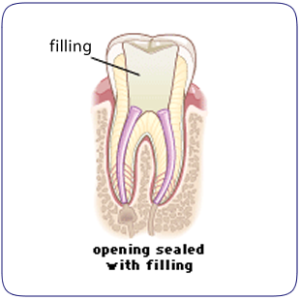Endodontic Treatment (Non-Surgical Root Canal)
A root canal is one of the most common dental procedures performed, well over 24 million procedures every year. With modern technology and specialists that focus solely on endodontics, over 95% of root canal treatments are successful. This simple treatment can save your natural teeth and prevent the need of dental implants or bridges. Remember, nothing is better than keeping your natural tooth!
When you look at your tooth in the mirror, what you see is the crown, which is made of enamel and dentin. The rest of the tooth is hidden beneath the gum line, which is called the root. Inside the root(s) are small, thin passageways containing pulp tissue that branch off from the top chamber through the root tip. The pulp tissue is soft and is a collection of connective tissue, blood vessels and nerves that help to build the surrounding hard tissues of the tooth during development. The pulp is important during a tooth’s growth and development. Once a tooth is fully mature, it can survive without the pulp.
Sometimes the pulp inside the tooth becomes infected by disease or bacteria, or damaged by a traumatic injury. Fractures of the tooth, periodontal disease and even repeated dental procedures may contribute to pulpal degeneration. Sometimes the disease process or symptoms may not manifest until much later in time. Endodontic treatment is necessary when the pulp becomes inflamed or infected. If pulpal inflammation or infection is left untreated, it can cause pain or lead to an abscess. An infected and untreated root canal can allow bacteria in the mouth to enter the bloodstream where it will then lead to erosion of the bone beneath the tooth and cause infections in other parts of the body. Signs of pulp damage include pain in the tooth, prolonged sensitivity to cold or hot, and swelling in the nearby gums. Sometimes there may be no symptoms.
How is a root canal performed?
If you experience any of these symptoms or x-rays show an abscess, your general dentist will most likely recommend endodontic treatment to eliminate the diseased pulp. A rubber sheet is placed over your tooth to isolate the working field and prevent debris and instruments to fall into your mouth. A small access is made through the top of the tooth in posterior teeth, and behind the tooth in anterior teeth to access the pulp chamber and canals. After the diseased pulp is removed the root canal system is thoroughly cleaned, disinfected, and sealed. This therapy involves local anesthesia and may be completed in one visit. More complicated and diseased cases may require a 2nd visit in our office to achieve the highest level of quality care. If your tooth is not amemable to endodontic treatment or if the chance of success is unfavorable, you will be informed at the time of consultation or when a complication becomes evident during or after treatment. Also, you will be able to drive home after your procedure.
What happens after treatment?
After root canal therapy has been completed, your tooth will be filled with a temporary restoration. A report of your treatment with x-ray will be sent to your general dentist. You should contact their office for a follow-up permanent restoration within a couple of weeks after treatment is completed at our office. In the meantime, you should not chew or bite on the treated tooth in the initial few days to allow it to heal. Once the tooth starts to feel better, be cautious with chewing and biting until your dentist can restore your tooth. An unrestored tooth is susceptible to fracture. Your restorative dentist will decide on what type of restoration is necessary to protect your tooth. Otherwise, you need only to practice good oral hygiene, including brushing, flossing, and regular checkups and cleanings. It is uncommon for endodontic patients to experience complications after routine endodontic treatment. Occasionally, if a problem does occur, or if you have questions, we are here to help you.
Certain teeth that are severely infected we will follow-up with an examination to evaluate the healing progress. The appointment will require only a few minutes and no additional fee will be charged.
Root Canal Video









